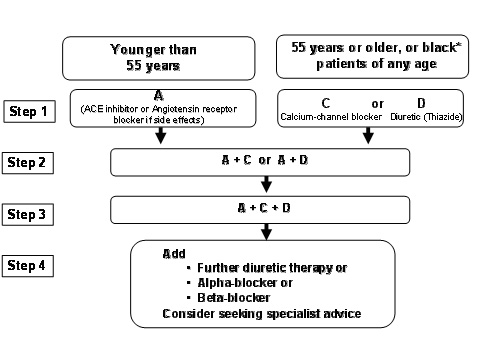Experts Comment on New Blood Pressure Guidelines
Jun 29, 2006, 01:52, Reviewed by: Dr. Sanjukta Acharya
|
|
"The Hypertension Guideline update is good news for doctors treating hypertension and more importantly for people with high blood pressure. We now have clear, unified, evidence-based advice on the optimal drugs for younger and older individuals, and how to use these drugs to achieve the recommended targets."
|
By M.I.N.D.S.,
Professor Peter Littlejohns, Clinical and Public Health Director at NICE and Executive Lead for the guideline, said: �It is unusual for NICE to consider reviewing its guidance ahead of its planned review date. In this case however, because significant new data became available, we took the decision to consider that data as part of a limited review of the existing NICE guideline. It is important to emphasise that the review was limited to the pharmacological aspects of managing hypertension. The original guideline also covered other aspects of managing the condition, such as lifestyle interventions, and these remain crucial to a proper holistic approach to controlling blood pressure.�
Professor Bryan Williams, Member of the Guideline Development Group and Professor of Medicine, University Hospitals NHS Trust, Leicester, said: �This is a hugely important step for people with hypertension and the healthcare professionals who treat them. This new guidance has benefited from a rigorous evaluation of the evidence and has resulted in a simple, pragmatic and practical approach to treating blood pressure, one of the most important causes of premature death in the UK. In addition, the recommendations have undergone a cost-effectiveness analysis which has reinforced the guidance. It is no longer a case of �can we afford to do it?� but more, �can we afford not to do it!� The decision to recommend that beta-blockers should no longer be used as a routine initial treatment for high blood pressure is a bold decision and the correct decision.�
Professor Morris Brown, President of the BHS and member of the guideline development group, said: "The British Hypertension Society is pleased to be a partner in the first joint guideline between NICE and a specialist society. The application of the full rigour of the NICE process to the newer data on drug treatments has resulted in recommendations which, although not dissimilar to those at which the BHS arrived two years ago, has permitted some preferences to be expressed between drugs of the �AB� and �CD� pairs used in the treatment of hypertension. I hope that the new guideline will both stimulate and enable doctors to review treatment of all their patients with hypertension, and achieve the internationally accepted target blood pressure of 140 in the majority of patients.�
Dr Mark Davis, GP, of the Primary Care Cardiovascular Society and member of the Guideline Development Group, commented: �Primary care will welcome this unified guidance from two authoritative and respected organisations. The management of hypertension forms a major part of our workload and we can incorporate this update into our practice protocols. This will help us to further improve our success in managing this important cardiovascular risk factor to the benefit of our practice population. "
 |
| Courtesy: Blood Pressure Association (BPA) |
Jan Procter- King, Nurse Practitioner and member of the Primary Care Cardiovascular Society and Guideline Development Group, said: �These guidelines will be very welcome to all primary care nurses. Since the introduction of the Quality Outcome Framework for general practice, hypertension has been a fundamental focus of the primary care nurse. These pragmatic evidence based guidelines, presented in this clear manner, will I am certain, support the delivery of evidence based hypertension management.�
Jean Thurston, patient and carer representative on the guideline development group, said: �It is reassuring for patients to know that the treatment changes recommended in this guideline are based on the very latest evidence available and use a consistent approach. The accompanying Information for Patients literature is informative and should be easily understood by everyone.�
Professor Graham MacGregor, Chairman of the Blood Pressure Association, said: �High blood pressure is by far the biggest preventable cause of death and disability in the UK through the strokes, heart attacks and heart failure that it causes. This new agreed treatment regimen is tremendous news for people affected by raised blood pressure as the combination of drugs suggested are more effective and have less side effects. This will result in much better control of blood pressure and therefore large reductions in stroke, heart attack and heart failure.
Sarah Ransome, BPA Head of Information and Support, said: "Living with high blood pressure can be very difficult. We know from our own research that beta-blockers commonly cause side effects, including tiredness, lethargy, impotence and mood swings, and can enormously impact on that individual and their family's quality of life.
"The Hypertension Guideline update is good news for doctors treating hypertension and more importantly for people with high blood pressure. We now have clear, unified, evidence-based advice on the optimal drugs for younger and older individuals, and how to use these drugs to achieve the recommended targets." Professor Gordon McInnes, Vice-President, British Hypertension Society

- National Institute for Health and Clinical Excellence (NICE) & BPA
www.nice.org.uk/page.aspx?o=CG34
For any corrections of factual information, to contact the editors or to send
any medical news or health news press releases, use
feedback form
Top of Page
|